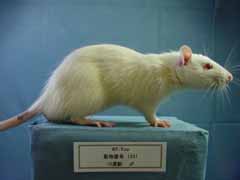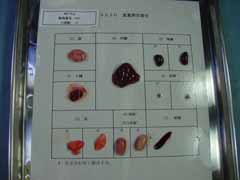| NBRP Rat No: 0259 |
Strain name: WF/Kop |
Commmon Name: Wistar Furth |
Rat Genome Database |
| Principal Investigator: |
Ichiro Semba Kagoshima University 8-35-1, Sakuragaoka 890-8544 Kagoshima Japan |
| Tel: 099-275-6142 Fax: 099-275-6148 |
Email: semba@dent.kagoshima-u.ac.jp |
| Preservation Status: |
Embryo Sperm Living Animals |
 |
 |
| Coat Color |
albino (c) |
| Inbred Generations |
F103+26 (April 2012) |
| Usage Restrictions |
In publishing the research results to be obtained by use of the BIOLOGICAL RESOURCE, a citation of the following literature designated by the DEPOSITOR is requested.
Kitano, M., Hatano, H. and Shisa, H.
Strain difference of susceptibility to 4-nitroquinoline 1-oxide-induced tongue carcinoma in rats.
Jpn. J. Cancer Res. 1992, 83: 843-50. |
| Genetic Status |
|
| Comercial Availability |
|
|
| Research Category |
|
| Gene Affected |
|
| Origin |
J Furth established this strain from Wistar with a predilection for leukemia in 1945. Transferred to Hiroshima University, to Saitama Cancer Center in 1976, and to Kagoshima University Faculty of Dentistry in 1986. Other names are Wistar Furth and W/Fu. (Aug 17, 2010) |
| Strain characteristics |
WF rats were resistant to 4NQO-induced tongue carcinomas (Kitano, 1992; Kitano, 1996). Genetic analysis identified five significant QTLs, Tscc1, 2, 3, 4, 5 (Other names are Tcas5, 6, 2, 3, 4, respectively) (Tanuma, 1998; Tanuma, 2001). Several congenic lines carrying these QTL regions have been established (Please refer to NBRP No. 0265-0269). Class I MHC of the WF rat is RT1u. (Aug 17, 2010) |
| Breeding Conditions |
|
| Genotyping |
|
| References |
Igarashi M, Hippo Y, Ochiai M, Fukuda H, Nakagama H.
AKT is critically involved in cooperation between obesity and the dietary carcinogen amino-1-methyl-6-phenylimidazo [4,5-b] (PhIP) toward colon carcinogenesis in rats.
Biochem Biophys Res Commun. 2013 Dec 13. pii: S0006-291X(13)02128-1.
化研紀要 33:3-12, 2002
Kitano M, Hatano H, Shisa H.
Strain difference of susceptibility to 4-nitroquinoline 1-oxide-induced tongue carcinoma in rats.
Jpn J Cancer Res. 1992 Aug;83(8):843-50.
Kitano M, Hirayama Y, Tanuma J, Matsuuchi H, Miura Y, Li TJ, Semba I, Ozaki HS, Kokubu T, Hatano H, Tada M, Kobayashi Y, Shisa H.
Genetic controls of susceptibility and resistance to 4-nitroquinoline 1-oxide-induced tongue carcinomas in rats.
Jpn J Cancer Res. 87(11):1097-101, 1996.
Tanuma J, Shisa H, Hiai H, Higashi S, Yamada Y, Kamoto T, Hirayama Y, Matsuuchi H, Kitano M.
Quantitative trait loci affecting 4-nitroquinoline 1-oxide-induced tongue carcinogenesis in the rat.
Cancer Res. 15;58(8):1660-4, 1998.
Tanuma JI, Fujii K, Hirano M, Matsuuchi H, Shisa H, Hiai H, Kitano M.
Five quantitative trait loci affecting 4-nitroquinoline 1-oxide-induced tongue cancer in the rat.
Jpn J Cancer Res. 2001 Jun;92(6):610-6. |
| Additional strain information |
WF |
|
|